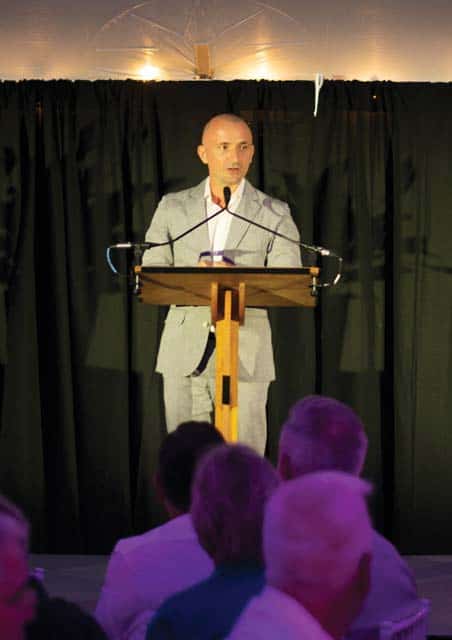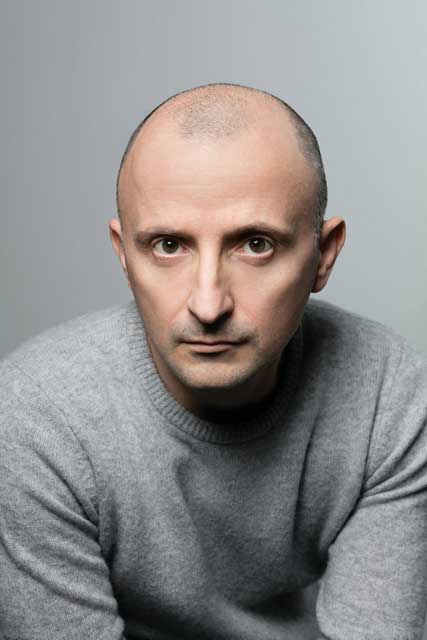by Rebecca M. Alvin
“I’m very suspicious of being ‘a writer,’” says Salvatore Scibona on the morning of the Fine Arts Work Center (FAWC) Awards Gala where he was later honored for his service to FAWC and as a successful writer. The former FAWC Writing Fellowship Coordinator explains, “I try very hard to keep my attention on doing the thing, rather than being a person who does the thing. So for the longest time, when I had my job at the Work Center and I was writing my novel, when I had to actually fill out a tax form or something and it said ‘what is your occupation?’ I would say ‘clerk.’” Scibona laughs. While he may not like the label of being a writer, and he does still have a day job (as the Director of the Cullman Center for Scholars and Writers at the New York Public Library), his latest book The Volunteer, and the previous one, The End, which was a finalist for the National Book Award, are definitive evidence that Scibona is not only a writer, but an exceptional one at that.
Writing is one of those creative endeavors that require discipline just as much as they require openness and creativity. When Scibona went to the prestigious Iowa Writers Workshop for his graduate degree, he says he really had no writing habits, having focused his undergraduate studies in philosophy, math, and other courses. So once in Iowa, he was ready for some advice on how to develop discipline as a writer.

“I was ready to get programmed, to get like a habit, and the first day at the Workshop, Frank Conroy had everybody in all together in the lobby of the building and said, ‘You guys are going to do whatever you want. There are no tests, there are no grades. You’re here to become writers. If I was you, I would write at the same time, in the same place, for three hours a day, six days a week.,’” recalls Scibona. “That little bit was all I needed. And that’s basically all I’ve ever done.”
That habit took Scibona through the 10-year process of writing The Volunteer, a deeply layered story that begins with a child being abandoned by his father in an airport bathroom in a country where he does not speak the language. It is from this point that Scibona backtracks to answer the question of why a father would do such a thing. And so the narrative covers multiple generations, relationships, and circumstances connected by the thread of the main character, Tilly, a Vietnam veteran who loses his identity, quite literally, when his survival of an illegal military action threatens national security. But it is the character development and Scibona’s beautiful writing—perhaps more than the plot itself—that make The Volunteer such an absorbing read.
Scibona’s approach to character is a highly individualized one where, of course, the characters come from a certain background and time period and they have various identity markers of race, gender, sexuality, etc., but, he says, there is a danger in focusing too much on these sociological aspects of a character, just as there is a danger in real life of seeing someone (he uses the example of a spouse) as a representative of his/her gender, culture, or race versus finding out about him/her as a unique individual who may or may not conform to stereotypes.

“The thing that is aesthetically objectonable to me about that way of thinking, is basically the same thing, the same risk that comes from cliché. You know, you take something off of a shelf that’s true in general and end up saying something that’s untrue of the person in particular. You know: ‘Men are reticent.’ No, I’m kind of loquacious, actually. It happens that this guy is reticent and that maybe that’s true of a lot of guys from this time,” he explains.
In The Volunteer, several individuals either lose their name or go by a different name or multiple names, begging the question: What’s in a name? Scibona is thoughtful in his response. “First of all, it is a fact of most people’s lives that in some important way their name changes over the course of their lives,” he says. “You might have a family name that they call you back home. You grow up and you use a different version of that name. You get married, you change your name. You transition and change your name. You immigrate—lots of people will totally drop a whole langauge associated with their name for another one. I think the name is the closest thing that language has to a soul on the page.”
His process of naming is one he says he hesitates to be too deliberate about. “Usually, I’m attached to them for some relatively accidental way at first… I feel as though I picked it for some complicated plot means, but usually I’m picking it for sound,” he says.
This is an example of how Scibona’s writing comes to have its flow. The sentences are structured beautifully, enabling us to kind of fall into a trance reading them, truly becoming lost in the universe of the characters. It’s a remarkable quality, one he no doubt hones as a Writing Fellow himself at FAWC, both in 2001 and in 2002.

In addition to his first book being nominated for the National Book Award, Scibona has received a Guggenheim Fellowship, a Fulbright Fellowship, a Pushcart Prize, an O. Henry Award, and the Whiting Award. Although he lives and works in New York now, living here in Provincetown for several years, he understands the difference between coming to visit in the summer and being a year-round resident.
“My fiancée and I were on the boat and she’s been here once before with me. And she said, ‘You know, I feel like the happiest place in the world is the ferry on a Friday going into Provincetown.’ And I said, ‘In the summer!’” he laughs. “Because I think of Provincetown, in my experience, rather curmudgeonly. For people who actually live here year-round like I did, the winter is long!”
Comparing New York and Provincetown, Scibona says, “I can’t make sense of the two paces of life. I mean I spent all this time in Provincetown with my mind organized in units of like an hour or two, and where I live now, it’s like three or four seconds.” The influence of Provincetown has stayed with him. “I don’t know other places like Provincetown that are slow and thoughtful in this way, and also social. That’s the thing. You know, it’s like you can go away to a place in the country and unplug from communal life, but Provincetown is like there’s always people around, but not in a rush,” he marvels.
Salvatore Scibona’s The Volunteer was released in March 2019 by Penguin Press. It is available online and wherever books are sold. Please support your local bookseller.





